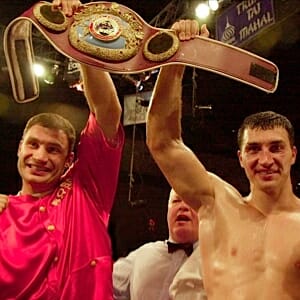Klitschko

Despite a confusing opening sequence and a disappointingly anticlimactic ending, Klitschko makes for a thrilling boxing documentary. Profiling Vitali and Wladimir Klitschko, the Ukrainian-born, German-adopted pugilists who are the first brothers to hold world championship heavyweight titles at the same time, director Sebastian Dehnhardt captures the ups and dramatic downs of careers that started in illicit kick-boxing clubs in communist Soviet Union and culminated in more than a half-dozen championship belts between them.
Unfortunately, Dehnhardt takes his time getting into this narrative, starting instead with an almost impressionistic prologue documenting the buildup to an unidentified match. Arena preparations are intercut with locker-room pep talks while a voiceover explains what it’s like to be inside the ring. The language is evocative, especially when it describes being “two times as strong” with a brother at ringside. But we don’t know the Klitschkos yet, and despite a five-year age difference, they look a lot alike, so all this poetry of words and imagery is wasted on viewers who haven’t yet established an intimate connection with the subjects.
But they will, for the Klitschkos are handsome, intelligent and charismatic, with adorable parents interviewed here for the first time. Dehnhardt returns to the military barracks where the boys grew up, including a stint at Chernobyl at the time of the nuclear disaster—an incident to which the family attributes their father’s cancer today. They recall playing with live landmines and splashing in pools of radioactive runoff. A strict disciplinarian, their father taught them to fight only if absolutely necessary, but then to fight to win.
-

-

-

-

-

-

-

-

-

-

-

-

-

-

-

-

-

-

-

-

-

-

-

-

-

-

-

-

-

-

-

-

-

-

-

-

-

-

-

-








































